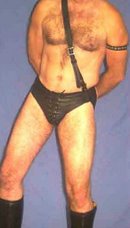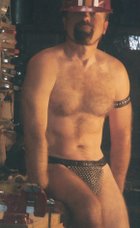Yesterday on the way home from work, I was listening to NPR's afternoon drive home program, "All Things Considered" They had an interesting discussion on male self image. They based part of the piece on a study published in the American Journal of Psychiatry. The article is titled, "Male Body Image in Taiwan Versus the West:Yanggang Zhiqi meets the Adonis Complex"
While the study focused on 55 heterosexual men, some of the finds apply to us and our self body image. Guys in the US and Europe tend to see themselves wanting to get bigger by say, 25 pounds of muscle. Of course, certain gay men in various Yahoo bodybuilding groups, think the ideal figure is 50 pounds of muscle. As usual, we as a group exaggerate. Personally, if you are under 150 pounds, 25 pounds of muscle is more than adequate to carve definition. Anyone over 200 should try to come down 25 pounds and then build muscle definition appropriately.
In the Taiwanese study, the authors hypothesized that Taiwanese men would exhibit less dissatisfaction with their bodies than Western men and that Taiwanese advertising would place less value on the male body thatn Western media. They consider Western men, especially younger guys to display unrealistic body ideals and that Western advertising seems to place an increasing value on the male body (just think the old Marky Mark Calvin Klein underwear ads).
They concluded that Taiwanese men exhibited significanlty less body dissatisfaction than their Western counterparts. In the magazine study, American magazine advertisements portrayed undressed Western men frequently, but in Taiwanese mags, they rarely portrayed undressed Asian men. In summary, they felt that Taiwanese men appear less preoccupied with the male body image than Western societies.. They felt that 1) Western traditions emphasizing muscularity and fitness as the primary measurement of masculintity; 2) increasing exposure of Western males to muscular male bodies in media images, and 3) greater decline in tradition male roles in the West, leading to greater emphasis on the body as a mesure of masculinity.
I learned a new word in all of this, dysmorphic disorder. The term implies that a guy always feels that his self image or what he sees in the mirror is never too muscular enough. He strives for even bigger muscles, no matter the level of his current muscle development.
You guys know me as one who feels that muscles, while playing an important role in self image, do more for you than what we see on the exterior. A flatter stomach helps a guys ward off stroke. More back muscles help support the spine. Being stronger is a benefit, going overboard is a liability.
Too much of anything is necessarily good. Moderation is best in everything we do for or with our bodies. But if we didn't have muscles, how could we give each other big hairy muscle hugs?
Subscribe to:
Post Comments (Atom)











3 comments:
Buff:
Very interesting piece you wrote there buddy. I had just wrote a blog entry on my site because I felt I have been a gym slacker this week. Thanks for your post. There is nothing wrong with wanting to have a V shape as opposed to looking pregnant (like most typically straight Americans men do). I don't want a tool shed over my dickie doo!
This is something that I have noted for some time. Not only are Western men becoming more body conscious, but that we are exposed to a lot more imagesof ourselves then we were say 20 years ago. Further, these images areall of a similar sort - smooth, very well defined, no older than 30.
What disappoints me is the way that we have started to receive these messages as the ideal for men. Many of those models, like many men, are not naturally smooth, and yet more and more I see that gay men are peceiving this as how an ideal man should be. This is disappoiting.
On a personal level, I go to the gym, work out, try to stay fit. Frankly, this is mainly because I can attract a lot more men when I look half way decent. Peronally, I'm not that interested in a perfect body. I often go for guys who are skinny, or slightly overweight. In my experience a perfect body has no relationship with sexiness, skill or chemistry.
I definitely agree with all the comments posted.
You guys hit a common chord. It's all about perception. The ideal man doesn't exist. Body image is who we are and what attracts us to other types of men is an individual
choice. Glad guys really don't shave their body hair and are hunky just the way they are. WOOF
Post a Comment